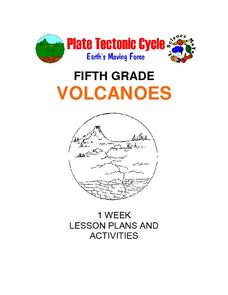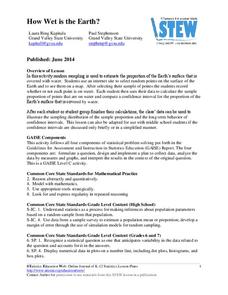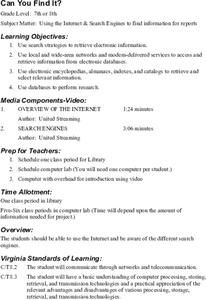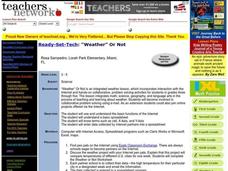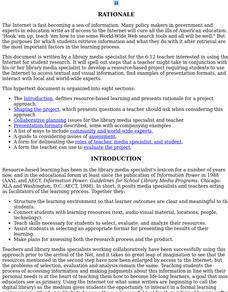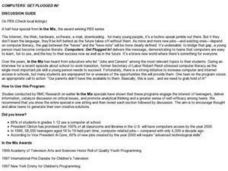Curated OER
Volcanoes: Fifth Grade Lesson Plans and Activities
Fifth graders explore volcanoes and the rocks they produce using the Internet. The lab portion of the lesson prompts young scientists to compare and describe igneous rocks. Next, they critique a pair or more of books on volcanoes in...
National Council for the Social Studies
Analyzing a Product or Political Advertisement
How do advertisements evoke specific thoughts and feelings? Class members find out through the exploration of the Internet, videos, television, magazines, radio, and posters. Learners investigate commercial advertisements, political...
Kenan Fellows
Letter Writing to Politicians on Environmental Issues
Let your voices be heard! Pupils research local and national environmental concerns using the Internet. Class members determine an issue they deem important and draft a letter to a local politician expressing their concern about the...
Teach Engineering
Curb the Epidemic!
Class members use an applet on the Internet to simulate the spread of a disease. The simulation allows individuals to determine two nodes to vaccinate to limit the number of nodes infected. By running several simulations, scholars can...
Statistics Education Web
How Wet is the Earth?
Water, water, everywhere? Each pupil first uses an Internet program to select 50 random points on Earth to determine the proportion of its surface covered with water. The class then combines data to determine a more accurate estimate.
Curated OER
Become a Character: Adjectives, Character Traits, and Perspective
High schoolers use an online chart to match the character traits of a character in a book they are reading with specific actions the character takes. Students then work in pairs to "become" one of the major characters in a book and...
Annenberg Foundation
America's History in the Making: Classroom Applications Four
The final installment of a 22-part American history series examines the many faces that make up the country's story. From Henry Ford to Tulio Serrano, scholars use biographical evidence and Internet research to uncover the people behind...
Newseum
Slanted Facts and Slippery Numbers
The Internet is known as the information superhighway, but sometimes it's hard to know when to hit the brakes on unreliable sources. Using a well-rounded lesson plan, pupils read and summarize articles about the gender pay gap and...
Federal Trade Commission
Ad Awareness
Movie theaters, shopping malls, television, the Internet ... no matter where people go, they are inundated with advertisements. Scholars discuss the topic of ad awareness using the first of four Admongo lessons about advertising. Pupils...
American Museum of Natural History
Create Your Own Time Capsule
The corona virus pandemic is indeed a historic event. A time capsule activity permits young historians to document these days of social distancing, remote learning, and quarantine by collecting artifacts that capture what their lives are...
Curated OER
Net Gains
Students experience internet tutorials. They write a journal about how people use the Internet. Students explore web sites on internet training. In groups, students research an internet skill and create a guide for learners.
Curated OER
Technology's Influence on Language
Students use Internet resources to examine the influence of technological terminology on English and other languages.
Curated OER
A Guided Tour
Pupils identify differences in information found on the internet and in print books. They practice navigating between different pages and using shortcuts. They evaluate a site and share their findings with the class.
Curated OER
Can You Find It?
Students use the Internet and search engines to research a foreign country. They use the Internet and library to further their understanding on how to use those resources.
Curated OER
Can You Find It?
Fourth graders discover how to do an Internet search. They reviewi traditional rescources used to find answers in the classroom and are introduced to electronic sources. They discuss terminology for navigating the Internet using the...
Curated OER
Charlotte's Web Animal Research Projects
Students summarize information taken from the internet about animal character's from the story, "Charlotte's Web." Questions are created, answered, and entered into a book about the animal of their choice.
Curated OER
Weather Or Not
Young scholars use the internet to find pen pals to share in their weather experiment. Individually, they research the high and low temperatures for cities within the United States and email the results to their pen pal. They also...
Curated OER
Ready Reference Treasure Hunt
Fourth graders complete an Internet treasure hunt. They define terminology related to the Internet and after reviewing the various ways to conduct an internet search, they complete an Internet treasure hunt provided by the instructor.
Curated OER
Scavenger Hunt Poster
Learners use the internet to collect information for a poster. They answer specific questions given to them by their teacher on a topic of interest to them. They create a poster and share it with the class.
Curated OER
TV Without the Television
Pupils consider their own understanding of advertising on the Internet and examine the latest form of advertising online to create "How it Works" posters for a variety of Internet technologies. They reflect on how these technologies have...
Curated OER
The Jason Technology Project
Fifth graders use the Internet to participate in an interactive tour of the Jason Project. They explore the peninsula, coral reef and marine life off of the coast of Florida.
Curated OER
Rationale
Students consider the rationale behind using the Internet as a research resource tool. They develop a research project, consider how to access and assess new information and format their research for presentation to the class.
Curated OER
Space Presents Problems
Students use the internet to research problems related to space. They complete a questionaire to direct their research before beginning. They create a database of moon and planet characteristics.
Curated OER
Computers: Get Plugged In!
Students examine the significance of learning to use the computer and the Internet. They watch and discuss a video, conduct Internet research on a celebrity or historical figure, and teach a lesson to a person about navigating the Internet.


